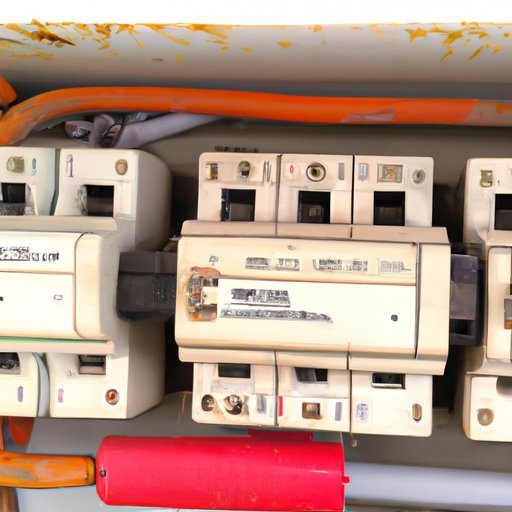Introduction
A breaker tripping is an issue that many people may have encountered in their homes. A tripped breaker occurs when the electric current flow is interrupted due to a problem with the electrical system. This can be caused by overloaded circuits, faulty wiring or appliances, short circuits, or ground faults. In this article, we will explore why a breaker keeps tripping and discuss solutions for avoiding future issues.
Identify the Reasons a Breaker Keeps Tripping
There are several reasons why a breaker may keep tripping. One of the most common causes is an overloaded circuit. This occurs when too much electricity is running through the same circuit, causing the breaker to trip. Another cause can be faulty wiring or appliances. If the wiring is not properly installed, it can lead to overloading and cause the breaker to trip. Additionally, if an appliance is defective, it can draw more power than it should, leading to a tripped breaker.
Short circuits and ground faults are also potential causes of breaker tripping. A short circuit occurs when two wires come into contact with each other, causing an excessive amount of electricity to flow. This can cause the breaker to trip in order to protect the circuit from damage. A ground fault is similar to a short circuit, but it occurs when electricity flows to an unintended ground. This can cause serious damage to the electrical system and may require an electrician to fix.

Understand the Different Types of Breakers and Their Functions
It is important to understand the different types of breakers and their functions in order to diagnose the cause of a tripped breaker. Standard circuit breakers are designed to protect the wiring in your home by automatically turning off power when an overload occurs. Arc-fault circuit interrupters (AFCIs) are specialized circuit breakers that detect arcing, which is a dangerous condition caused by damaged or loose wires. Ground fault circuit interrupters (GFCIs) are designed to detect ground faults and shut off power before any damage can occur.

Diagnose Common Causes of Breaker Tripping Issues
Once you have identified the type of breaker that is tripping, you can begin to diagnose the cause of the issue. Poorly installed wiring is one of the most common causes of breaker tripping. Faulty appliances can also draw more power than they should, leading to a tripped breaker. Finally, high electrical loads can cause the breaker to trip due to an overload. It is important to identify the cause of the breaker tripping before attempting to reset or replace it.

Troubleshoot Electrical Problems That Can Cause Breaker Tripping
Once you have identified the cause of the breaker tripping, you can begin to troubleshoot the issue. First, check the wiring in the area to make sure that it is properly installed and not damaged. Next, check all of the appliances connected to the circuit to see if any of them are faulty. Finally, reduce the electrical load on the circuit by unplugging some of the appliances or using less power.
Learn How to Reset or Replace a Tripped Breaker
If the breaker continues to trip after troubleshooting, then you may need to reset or replace it. To reset a tripped breaker, first shut off all power to the circuit. Then, locate the breaker and flip it to the “off” position. Finally, switch the breaker back to the “on” position. If the breaker continues to trip, then it may need to be replaced. It is best to consult an electrician for help with replacing a tripped breaker.
Avoid Future Tripping with Proper Maintenance
To avoid future breaker tripping issues, it is important to maintain your electrical system. Have an electrician check your system periodically to make sure that everything is working correctly. Additionally, consider upgrading your breaker panel if it is outdated. Installing surge protectors can also help to reduce the likelihood of a tripped breaker.

Discuss Safety Precautions for Dealing with Breaker Tripping
When dealing with breaker tripping issues, it is important to take safety precautions. Wear protective gear such as gloves, goggles, and long sleeves to protect yourself from electric shocks. Additionally, unplug all appliances before working on the circuit and shut off all power when working. Following these safety precautions can help to ensure that you do not get injured while diagnosing the issue.
Conclusion
In conclusion, a breaker tripping can be caused by overloaded circuits, faulty wiring or appliances, short circuits, or ground faults. It is important to understand the different types of breakers and their functions in order to diagnose the cause of the issue. Once the cause has been identified, you can troubleshoot the issue and reset or replace the breaker if necessary. To avoid future issues, make sure to have an electrician check your system periodically and install surge protectors. Always remember to take safety precautions when dealing with breaker tripping issues.
Summary of Key Points
• A breaker tripping can be caused by overloaded circuits, faulty wiring or appliances, short circuits, or ground faults.
• Understand the different types of breakers and their functions in order to diagnose the cause of the issue.
• Troubleshoot the issue and reset or replace the breaker if necessary.
• Have an electrician check your system periodically and install surge protectors to avoid future issues.
• Take safety precautions when dealing with breaker tripping issues.
Final Thoughts
Breaker tripping can be a scary experience, but by understanding the causes and taking the proper steps to prevent it, you can keep your home safe and save yourself time and money in the long run. Remember to always consult a professional electrician if you are unsure of how to address an issue with your electrical system.
(Note: Is this article not meeting your expectations? Do you have knowledge or insights to share? Unlock new opportunities and expand your reach by joining our authors team. Click Registration to join us and share your expertise with our readers.)
